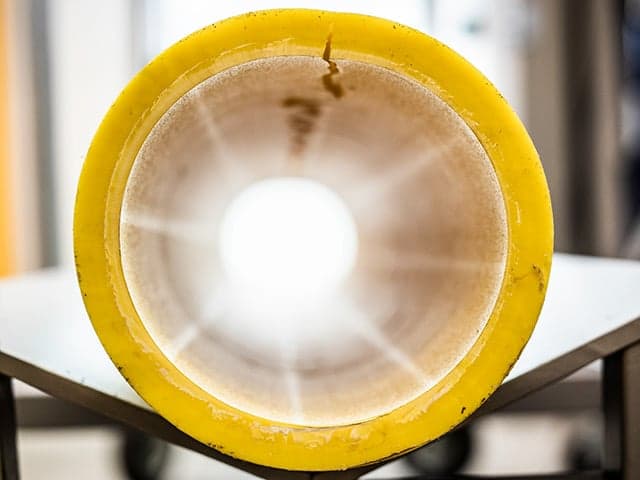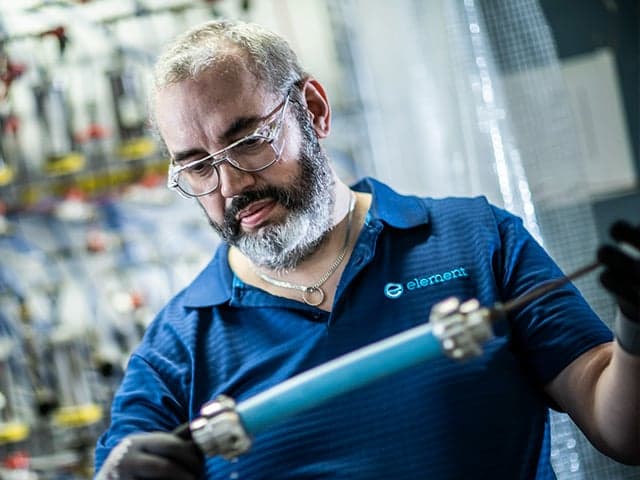Rapid Crack Propagation Test – S4 Test – to ISO 13477
Accelerate your product certification. Get precise, reproducible test data for PE pressure pipes in sub-zero conditions. Our advanced S4 testing validates your products' performance against rapid crack propagation, streamlining your certification process and supporting faster market entry. Meet ISO 13477 requirements through independent verification that advances your business goals.

What is Rapid Crack Propagation Testing at Element?
Rapid crack propagation (RCP) testing investigates the sudden fractures that can occur in thermoplastic pressure pipes, especially polyethylene (PE), under specific stress and low temperatures. In critical infrastructure, particularly in sub-zero conditions, it is crucial to understand a material's resistance to RCP to ensure long-term safety and performance.
At Element, we perform ISO 13477-compliant, Small-Scale Steady-State (S4) testing to evaluate your products' resistance to RCP. This efficient, small-scale method delivers reproducible results that aid in product development, certification, and performance evaluation, serving as a faster and more cost-effective alternative to full-scale testing.

What Can Element Offer You For ISO 13477 Rapid Crack Propagation Testing?
Components and materials we test
Components and materials we test
Our testing program focuses on Polyethylene (PE) Pressure Pipes, where we evaluate crack propagation, particularly in sub-zero conditions, to ensure optimal performance and long-term durability. We also test a broad range of Thermoplastic Pipes, including Polypropylene and PVC, assessing their crack initiation and propagation characteristics under various conditions. Additionally, we conduct thorough testing on Industry-Relevant Resins, supporting manufacturers in refining their formulations to meet industry standards and deliver products that stand the test of time.
Key tests offered
Key tests offered
Access critical testing data through our comprehensive S4 test program, designed to ensure reliability and performance of your products in demanding conditions:
- Critical Pressure Test: This test determines the pressure at which RCP occurs, helping you understand your material’s pressure limits.
- Critical Hoop Stress Test: We assess the hoop stress required for crack initiation and propagation, ensuring that your pipes and materials can withstand internal stresses in real-world applications.
- Critical Temperature Test: Our testing evaluates the temperature threshold at which rapid crack propagation becomes a risk, particularly important for applications in sub-zero environments.
Methods and solutions offered
Methods and solutions offered
We utilize advanced testing methods to ensure the highest accuracy and reliability for your materials, helping you make informed decisions regarding performance and certification.
- Controlled Conditions: We manage pressure and temperature to simulate real-world environments, providing realistic performance data.
- Impact Testing: Our experts strategically apply impact to initiate cracks with minimal disturbance for accurate results.
- Specialized Systems: Internal baffles and external cages stabilize testing conditions and prevent premature crack arrest.
- Small-Scale Efficiency: Our small-scale specimens offer a quicker, cost-effective alternative to full-scale testing while maintaining reliable accuracy.
Which labs offer this service
Which labs offer this service
Our primary testing facility in Sweden hosts 5,000 test stations, enabling rapid response times and comprehensive testing capacity. This advanced facility maintains strictly controlled environmental conditions for sub-zero temperature testing, supporting your certification needs with reliable, reproducible results.
Advanced digital analytics
Advanced digital analytics
Transform your test results into actionable insights through our advanced digital analysis capabilities. Your test data undergoes sophisticated computational modeling to predict long-term performance characteristics and identify potential failure modes. This enhanced analysis helps you optimize material selection, refine design parameters, and make data-driven decisions that strengthen your product development process.
Standards we meet and the materials we test
- ISO 13477: Small-scale steady-state test for rapid crack propagation
- ISO 9080: Long-term hydrostatic strength testing requirements
- ASTM D2837: Standard test method for hydrostatic design basis determination
Pressure pipe materials:
- Polyethylene (PE) pressure pipes
- Modified PE compounds
- Cross-linked polyethylene (PEX)
General thermoplastic materials:
- Polypropylene (PP)
- Polyvinyl chloride (PVC)
- High-performance thermoplastics
Industrial resins:
- Custom compound formulations
- Modified polymer blends
- Advanced material compositions
Your Challenges, Our Solutions
Sub-zero Performance Risks
Complex Certification Verification
Prolonged Development Timelines
Product classification and Lifecycle Uncertainty
Why Choose Element

Global testing reach
Independent results authority
Advanced Digital Analysis
Trusted industry knowledge

Explore our global network of labs and find your nearest location
VIEW ALL LOCATIONSRelated services

Plastic Pipes and Fittings Testing
Get ISO 17025 accredited plastic pipes testing with Element's 5,000 test stations. Independent lab services for hydrostatic pressure, crack propagation & lifetime evaluation. Trusted by global manufacturers.

Chlorine Resistance Testing to ASTM F2023, ASTM F2263 and ASTM F3497-21
Element provides independent chlorine resistance testing for plastic pipes using ASTM standards. The service evaluates oxidative resistance under accelerated conditions, delivering reproducible data for product classification and lifetime durability analysis.

High Flow Circulation Loop Testing Services
Element provides high-flow circulation pipe testing to resign manufacturers, pipe extruders, certification bodies and utility companies worldwide.

Hydrostatic Pressure Testing to ISO 9080 and ASTM D2837
Element's hydrostatic pressure testing measures long-term strength of plastic pipes per ISO 9080 and ASTM D2837 standards. This service assists resin manufacturers, pipe extruders, and certification bodies with product classification.

Slow Crack Growth Test to ISO 13479
Element's experts provide comprehensive slow crack growth testing to ISO 13479, ensuring the integrity of PE and PEX pipes in real-world applications.
